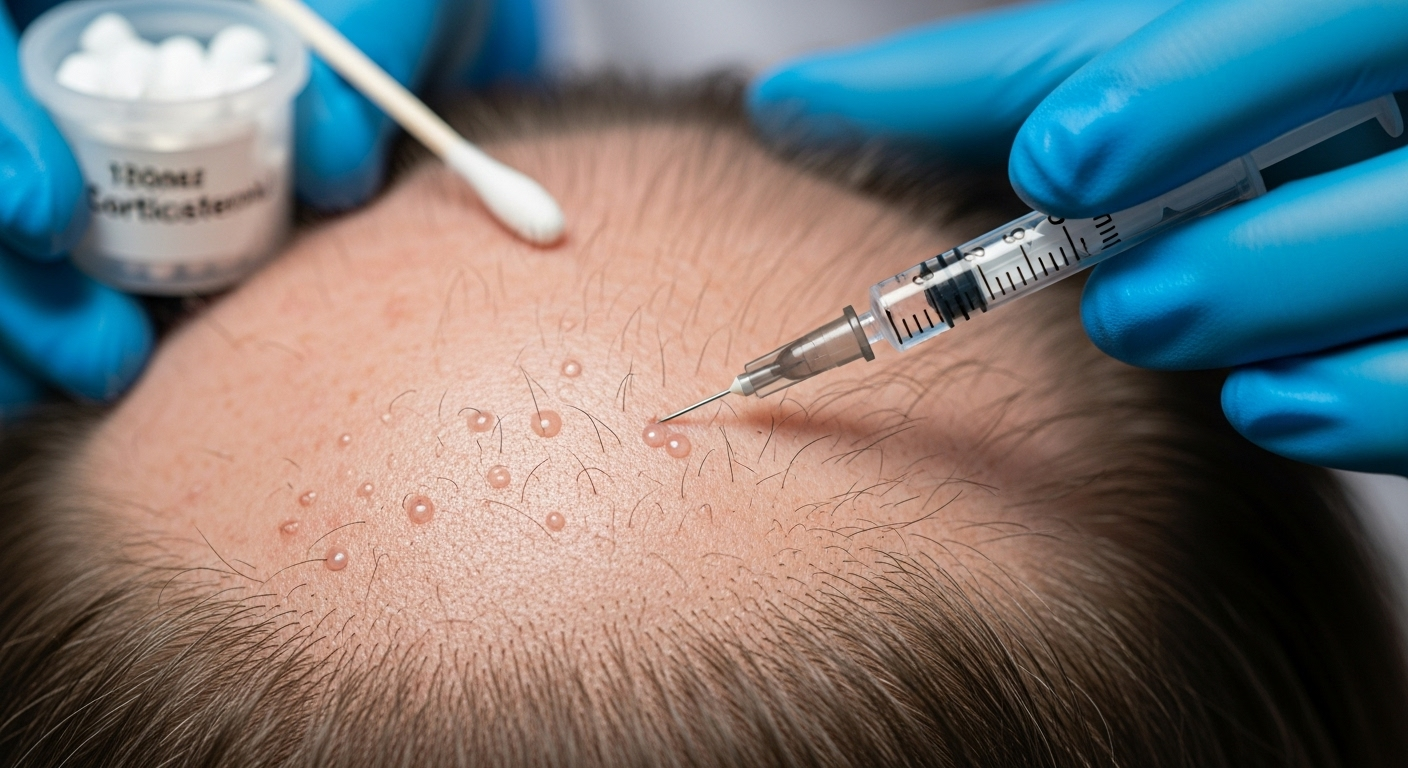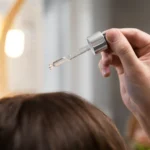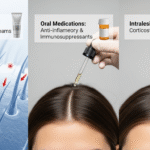Alopecia Areata is an autoimmune condition that causes sudden hair loss in small, round patches, affecting both men and women. If you're dealing with this condition in Islamabad, you may be wondering about the most effective treatment like Corticosteroids for Alopecia Areata Treatment options available. Corticosteroids are one of the most commonly used treatments for …
Alopecia Areata is an autoimmune condition that causes sudden hair loss in small, round patches, affecting both men and women. If you’re dealing with this condition in Islamabad, you may be wondering about the most effective treatment like Corticosteroids for Alopecia Areata Treatment options available.
Corticosteroids are one of the most commonly used treatments for Alopecia Areata, and this article will explore their effectiveness, the treatment process, and how you can benefit from it.

Understanding Alopecia Areata and Its Impact on Hair Growth
Alopecia Areata is a type of hair loss that occurs when the body’s immune system mistakenly attacks healthy hair follicles, leading to hair loss. This condition typically results in bald patches on the scalp or other areas of the body, and it can be distressing for those affected.
What is Alopecia Areata?
Alopecia Areata is an autoimmune disorder in which the immune system attacks the body’s hair follicles, causing them to shrink and produce less hair. The condition usually manifests in small, round patches of baldness, and while it can affect any part of the body, the scalp is the most common area. In severe cases, it can lead to complete hair loss, known as Alopecia Totalis.
Common Symptoms and Diagnosis of Alopecia Areata
The primary symptom of Alopecia Areata is sudden hair loss in small, circular patches. The affected areas are smooth, and there are usually no signs of redness or irritation. The condition is typically diagnosed by a dermatologist, who will examine the scalp and may perform a biopsy or blood tests to confirm the presence of autoimmune activity.
How Corticosteroids for Alopecia Areata Treatment in Islamabad are use

Corticosteroids are a type of medication that mimics the effects of hormones produced by the adrenal glands. These medications are known for their anti-inflammatory properties and are commonly used in treating autoimmune conditions like Alopecia Areata.
What Are Corticosteroids?
Corticosteroids are steroid hormones that regulate a wide variety of functions in the body, including immune responses. In the context of Alopecia Areata, corticosteroids help reduce inflammation in the scalp, preventing the immune system from attacking the hair follicles and promoting hair regrowth.
Different Forms of Corticosteroid Treatment for Alopecia Areata
There are several ways corticosteroids can be administered to treat Alopecia Areata:
- Topical Corticosteroids: These are creams or ointments applied directly to the scalp. They are usually the first line of treatment for mild cases of Alopecia Areata.
- Corticosteroid Injections: For more severe cases, corticosteroid injections are directly administered into the scalp. This method is known to be highly effective and provides faster results than topical treatments.
- Oral Corticosteroids: In rare cases, oral corticosteroids may be prescribed, but this is typically reserved for severe cases due to potential side effects.
How Corticosteroids Promote Hair Regrowth
Corticosteroids work by suppressing the immune system’s response, thereby reducing the attack on hair follicles. When the immune system no longer targets the hair follicles, it allows them to recover and start producing hair again. This results in the gradual regrowth of hair in the bald patches.
Benefits and Risks of Corticosteroid Treatment for Alopecia Areata

While corticosteroid treatments for Alopecia Areata are generally effective, it’s important to consider both the benefits and potential risks associated with their use.
Benefits of Corticosteroid Treatment for Alopecia Areata
- Hair Regrowth: The primary benefit of corticosteroid treatment is that it stimulates hair regrowth in the affected areas. In many cases, patients experience significant improvement within weeks of treatment.
- Quick Results: Corticosteroid injections, in particular, are known to provide quicker results than other treatments like topical minoxidil.
- Improved Scalp Health: Corticosteroids help reduce inflammation, which can improve the overall health of the scalp and prevent further hair loss.
Possible Side Effects and Risks
- Thinning Skin: Long-term use of corticosteroids, especially topical ones, can lead to thinning of the skin, making it more susceptible to bruising or tearing.
- Increased Risk of Infections: Because corticosteroids suppress the immune system, they can make the body more vulnerable to infections.
- Other Side Effects: Some individuals may experience weight gain, high blood pressure, or mood changes, particularly with oral corticosteroids.
The Treatment Process: What to Expect in Islamabad

If you’re considering corticosteroid treatment for Alopecia Areata in Islamabad, it’s important to understand the treatment process and what to expect.
Finding an Alopecia Areata Specialist in Islamabad
The first step is to consult a qualified dermatologist or specialist in Islamabad who has experience treating Alopecia Areata with corticosteroids. Look for a healthcare provider who can guide you through the treatment process and provide a personalized plan based on your specific condition.
The Step-by-Step Process of Corticosteroid Treatment
- Consultation: The dermatologist will assess the severity of your Alopecia Areata and recommend an appropriate treatment plan.
- Application/Injections: Depending on your condition, the doctor will either apply topical corticosteroids to the affected areas or perform corticosteroid injections into the scalp.
- Follow-up Appointments: You will need to return for follow-up appointments to monitor your progress and adjust the treatment as needed.
How Long Does It Take to See Results?
Results can vary, but many patients begin to see noticeable hair regrowth within 4-6 weeks of starting treatment. For some, it may take up to 3 months to see significant improvement. Consistency with treatments is key to achieving the best results.
Expert Insights: Should You Consider Corticosteroids for Alopecia Areata?
Case Studies and Patient Experiences
Many patients who have undergone corticosteroid treatment for Alopecia Areata have reported significant improvements in their condition. One patient, a 32-year-old woman, shared her success story, stating that after just two months of corticosteroid injections, she noticed a considerable amount of hair regrowth and improvement in scalp health.
Is Corticosteroid Treatment Right for You?
Corticosteroids are an effective and commonly used treatment for Alopecia Areata, offering fast results for many patients. However, it’s essential to understand the potential risks and consult with a qualified dermatologist to determine if this treatment is the right choice for you.
Weighing the Pros and Cons
Cons: Potential side effects like skin thinning and increased infection risk.
Pros: Effective for hair regrowth, quick results, and improved scalp health.
FAQs
Are corticosteroids the most effective treatment for Alopecia Areata?
While corticosteroids are highly effective, other treatments like minoxidil or immunotherapy may also be recommended, depending on the severity of the condition.
Can corticosteroids cause permanent side effects?
No, most side effects are temporary and subside once the treatment is stopped. However, long-term use may lead to skin thinning and other complications.
How often will I need corticosteroid injections for Alopecia Areata?
Typically, corticosteroid injections are administered every 4-6 weeks, depending on the individual’s response to treatment.
Is corticosteroid treatment safe for long-term use in treating Alopecia Areata?
Long-term use of corticosteroids should be monitored by a healthcare professional due to potential side effects. Your doctor will provide guidance on the duration of treatment based on your needs.
Consulting a Dermatologist in Islamabad
If you’re considering corticosteroid treatment for Alopecia Areata, consult with a trusted dermatologist in Islamabad to explore your treatment options and start your journey toward hair regrowth.
Ready to start your journey toward hair regrowth with corticosteroid treatment? Book a consultation with Dr. Uzma Irfan, an ISHRS-certified surgeon in islamabad, to discuss your treatment options and begin your path to recovery.






